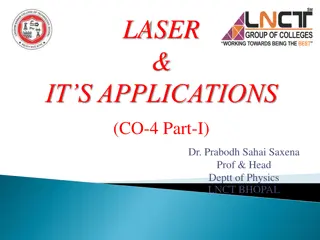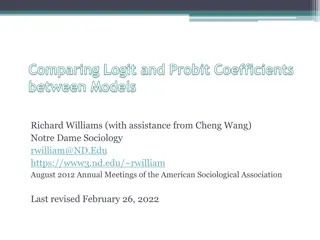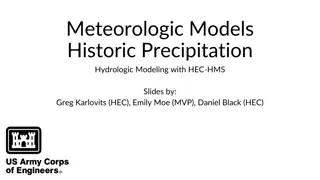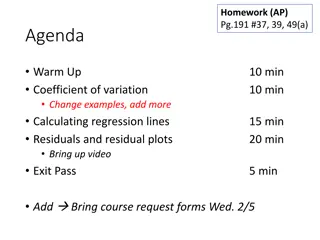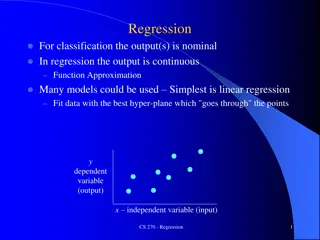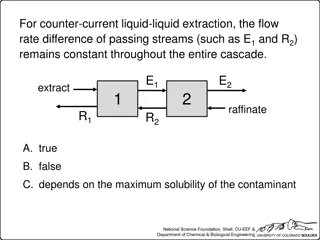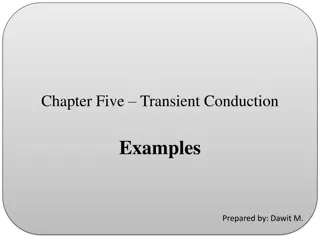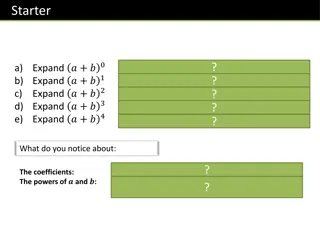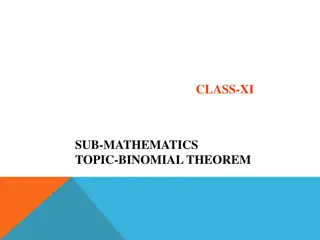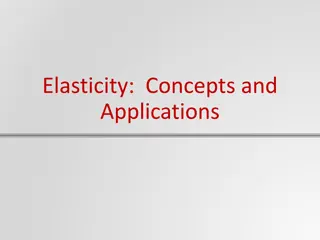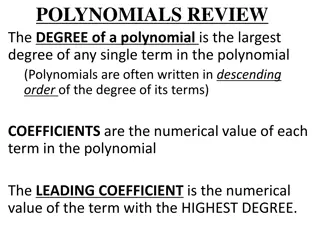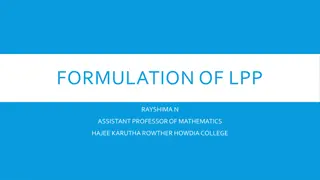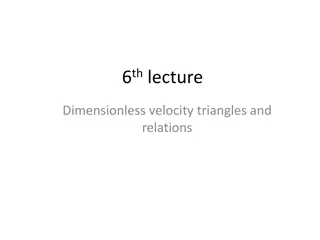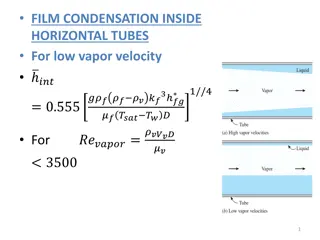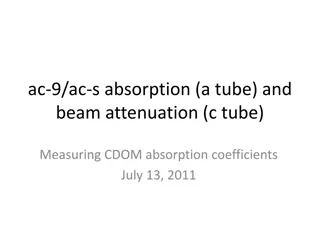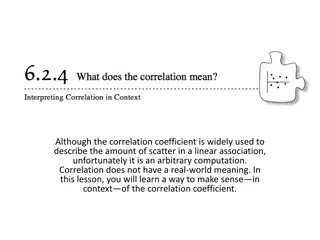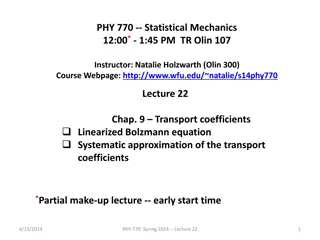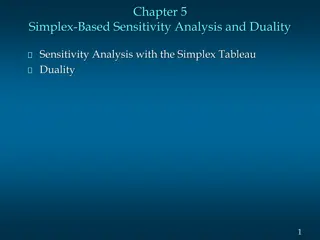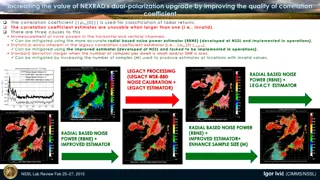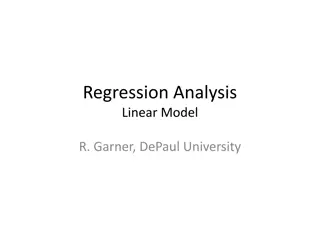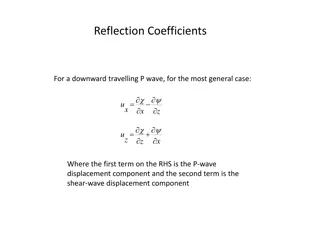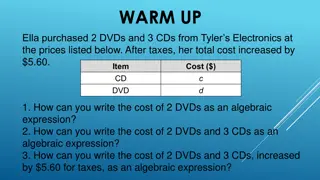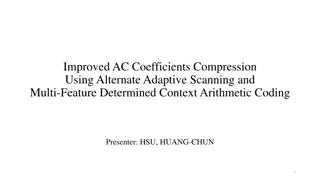Evaluation of feedstuffs by digestion experiments
The evaluation of feedstuffs through digestion experiments, including physical, chemical, and biological evaluations. It also discusses the measurement of digestibility and the different methods used for determining digestibility coefficients.
1 views • 49 slides
Understanding Magnetism: Properties, Forces, and Compass Deviation
Explore the fascinating world of magnetism encompassing magnetic materials, lines of force, induction, and the significance of blue/red poles. Delve into the complexities of Earth's magnetic field, compass errors, and the role of permanent and induced magnetism onboard ships. Discover the different
1 views • 18 slides
Understanding Algebra: Key Concepts and Problem-Solving
Algebra plays a crucial role in various fields, from designing computer games to modeling weather patterns. Mastering the rules of basic algebraic operations is essential for adding, subtracting, multiplying, and dividing terms and expressions. By learning key words and concepts like variables, coef
1 views • 64 slides
Understanding Second-Order Recurrence Relations: A Detailed Guide
Explore the concept of second-order linear homogeneous recurrence relations with constant coefficients through definitions, examples, and the Distinct Roots Lemma. Learn about characteristic equations and how to find solutions to recurrence problems. Delve into the Single Root Case and understand ho
0 views • 11 slides
Tight Binding Model Adapted for Graphene from Kittel Chapter 9
This content discusses the tight binding model adapted for graphene based on Kittel Chapter 9, covering topics such as Bloch conditions, hybridization, sublattices, and overlap integrals. It explores the uniqueness of graphene's structure and its impact on coefficients in the calculations.
0 views • 16 slides
Seminar 7 Digital Communication and Signal Processing
Learn how to design a second order ARMA filter to suppress sinusoidal disturbances in a signal while preserving the original signal. The process involves deriving the transfer function, determining coefficients, and sketching a block diagram representation of the filter.
0 views • 7 slides
Understanding Multicollinearity in Regression Analysis
Multicollinearity in regression occurs when independent variables have strong correlations, impacting coefficient estimation. Perfect multicollinearity leads to regression model issues, while imperfect multicollinearity affects coefficient estimation. Detection methods and consequences, such as incr
1 views • 11 slides
Understanding Correlation Analysis in Statistics
Exploring the concept of correlation in statistics: from measuring the strength of linear relationships between variables to interpreting correlation coefficients and coefficients of determination. A practical example involving bass drum sales and TV appearances by a popular group illustrates how co
0 views • 23 slides
Understanding Laser Technology: Principles, Applications, and Einstein's Coefficients
Exploring the fascinating world of lasers, this content delves into the principles governing laser technology, including the concept of stimulated emission by Einstein. It covers the characteristics of lasers, different types, and the significant contributions of pioneers in the field. The explanati
0 views • 14 slides
Comparing Logit and Probit Coefficients between Models
Richard Williams, with assistance from Cheng Wang, discusses the comparison of logit and probit coefficients in regression models. The essence of estimating models with continuous independent variables is explored, emphasizing the impact of adding explanatory variables on explained and residual vari
1 views • 43 slides
Hydrologic Modeling with Gridded Precipitation Data
Learn about utilizing gridded precipitation data for hydrologic modeling with HEC-HMS. Explore the advantages of spatially distributed precipitation sources such as RADAR and gauge comparisons, and understand the various national and regional products available. Discover utilities for converting and
3 views • 14 slides
Applications of Forces in Limiting Equilibrium for Solving Rigid Body Problems
Explore the principles of limiting equilibrium in rigid bodies with practical examples involving forces and friction. Learn how to analyze and solve problems, such as determining reaction forces and coefficients of friction, to ensure stability and balance in mechanical systems.
1 views • 8 slides
Statistics Homework and Course Reminders
Addressing topics including correlation coefficients, regression lines, coefficient of variation, and course request forms. The warm-up exercises involve interpreting given equations and coefficients. Reminders include due dates for assignment submission and suggestions for upcoming classes. Images
0 views • 18 slides
Understanding Regression in Machine Learning
Regression in machine learning involves fitting data with the best hyper-plane to approximate a continuous output, contrasting with classification where the output is nominal. Linear regression is a common technique for this purpose, aiming to minimize the sum of squared residues. The process involv
1 views • 34 slides
Stoichiometry Test Review Sheet
A comprehensive review sheet covering key concepts in stoichiometry, including molar ratios, coefficients in chemical equations, determining actual yield in reactions, identifying limiting reactants, calculating percentage yield, and understanding mole ratios in chemical reactions. The review provid
0 views • 11 slides
Liquid-Liquid Extraction Techniques and Considerations
Understanding liquid-liquid extraction processes like counter-current and co-current cascades, material balances, and system degrees of freedom. Topics include impact of flow rates, partition coefficients, solvent ratios, and purity on extraction efficiency.
0 views • 14 slides
Understanding Friction: Basics and Coefficients Explained
Friction is a force that opposes motion, influenced by surface texture and normal force. The coefficient of friction varies for objects at rest versus in motion. Learn about static and kinetic friction, key concepts, and how to solve friction problems step by step.
1 views • 19 slides
Transient Conduction in Thermal Energy Storage Units and Cylinders
Explore examples of transient conduction phenomena in thermal energy storage units, cylinders, and spheres. Learn how to calculate time durations, temperature changes, and energy removal rates during these heating and cooling processes. The examples cover scenarios involving aluminum slabs, oil bath
0 views • 10 slides
Binomial Expansion: Introduction and Examples
Explore binomial expansion basics, Pascal's Triangle, and examples like expanding expressions with ascending or descending powers. Understand the coefficients, powers of terms, and how to find specific terms in the expansion. Get a glimpse of binomial expansion before delving deeper into Year 12 mat
2 views • 10 slides
Understanding Binomial Theorem in Mathematics
Explore the Binomial Theorem in mathematics, covering Pascal's Triangle, binomial expansions, coefficients, general terms, and more. Learn how to expand binomials, analyze powers, find approximate numbers, and determine middle terms. Discover the structure of Pascal's Triangle and apply it to expand
0 views • 37 slides
Jury's Recommendations for the 2019 N.N. Bogoliubov Prize
Jury recommendations for the prestigious N.N. Bogoliubov Prize in theoretical and mathematical physics, recognizing outstanding contributions and international cooperation. Nominees include Prof. Dmitry Kazakov for quantum field theory advancements and Prof. Dam Thanh Son for achievements in chromod
6 views • 6 slides
Understanding Price Elasticity in Economics
Explore the key concepts of price elasticity in economics, including calculations, determinants, and applications. Understand the differences between price elasticity of demand and supply, learn how to calculate price elasticity, and interpret elasticity coefficients. Discover the responsiveness of
0 views • 31 slides
Understanding Inhalation Anaesthetics in Veterinary Pharmacology & Toxicology
Explore the world of inhalation anaesthetics in veterinary medicine, from the concept of MAC to the classification of gaseous and volatile agents. Learn about blood/gas and oil/gas partition coefficients, along with the properties of popular volatile anaesthetics like Ether, Halothane, and Methoxyfl
1 views • 15 slides
Understanding Algebraic Expressions: Variables, Coefficients, and Constants
Explore the difference between numeric and algebraic expressions, learn about the components of algebraic expressions - variables, coefficients, and constants. Discover how to identify variables, coefficients, and constants in expressions. Classify algebraic expressions as monomials, binomials, or t
0 views • 20 slides
Understanding Partial Differential Equations of Second Order
Exploring the concepts of second-order partial differential equations in mathematics, including the general form, linear equations with variable coefficients, and equations with constant coefficients. Learn about integral solutions, examples, and techniques for solving these equations with detailed
0 views • 21 slides
Understanding Polynomials: Degrees, Coefficients, and Graphs
Explore the essential concepts of polynomials, including degrees, coefficients, and graph shapes. Learn to identify leading coefficients, degrees, and relationships between polynomial functions and their graphs. Practice finding values of polynomials and analyzing the impact of degrees on the number
2 views • 16 slides
Formulation of Linear Programming Problems in Decision Making
Linear Programming is a mathematical technique used to optimize resource allocation and achieve specific objectives in decision-making. The nature of Linear Programming problems includes product-mix and blending problems, with components like decision variables and constraints. Various terminologies
1 views • 14 slides
Understanding Dimensionless Velocity Triangles and Relations in Turbomachinery
Explore the concept of dimensionless velocity triangles for passive and active machines, power coefficients, Gibbs equation, static enthalpy coefficients, degree of reaction based on enthalpy and pressure changes, and Euler's turbine formula in kinematic form. Gain insights into the relationships an
0 views • 17 slides
Heat Transfer in Condensation Processes: Film and Dropwise Mechanisms
Film condensation inside horizontal tubes for low vapor velocity is explored, highlighting the importance of the condensation number and heat transfer coefficients. Dropwise condensation, characterized by droplets on the surface, is also discussed for its effectiveness in heat transfer. The condensa
1 views • 16 slides
Comparison of CDOM Absorption Coefficients Using Different Filters and Instruments
This study conducted on July 13, 2011, analyzed the absorption coefficients of CDOM using various filters and instruments in different sample sources like open ocean, dockside, and Biscay pond dilution series. The comparison included measurements with ac-9 and ac-s filters of varying sizes, along wi
0 views • 11 slides
Understanding Diffusion Coefficients of Dyes in Hydrogels
Explore the calculation of diffusion coefficients of dyes in hydrogels based on factors like molecular weight, matrix mesh size, temperature, and chemical properties. Learn through in-class activities to determine the diffusion coefficients in different hydrogel concentrations, assess the applicabil
0 views • 6 slides
Understanding Correlation Coefficients in Data Analysis
Learn how correlation coefficients can be used to make sense of scatter in linear associations. Explore examples of analyzing height and shoe size data, unusual datasets, scatterplots, and regression equations to understand the variability and predictability in different scenarios.
0 views • 8 slides
Linearized Boltzmann Equation in Statistical Mechanics
This lecture delves into the linearized Boltzmann equation and its applications in studying transport coefficients. The content covers the systematic approximation of transport coefficients, impact parameters of collisions, and the detailed solution for a dilute gas system. It explores the notation
0 views • 25 slides
Sensitivity Analysis and Duality in Linear Programming
Sensitivity analysis in linear programming involves studying the impact of changes in objective function coefficients and constraint right-hand side values on the optimal solution. It helps in determining the range of optimality for coefficients and shadow prices for constraints. Duality analysis ex
0 views • 33 slides
Enhancing NEXRAD's Dual-Polarization Upgrade for Improved Correlation Coefficients
Enhance the value of NEXRAD's dual-polarization upgrade by improving the quality of correlation coefficients, particularly focusing on the usability and accuracy of | ρ hv (0)| for radar return classification. Addressing issues with correlation coefficient estimates exceeding one is crucial for val
0 views • 6 slides
Understanding Regression Analysis in Data Science
Explore the principles of regression analysis in data science, focusing on bivariate regression and linear models. Learn how to write the equation of a line to describe relationships between variables and assess the goodness of fit using scatterplots, correlation coefficients, determination coeffici
0 views • 29 slides
Understanding Reflection Coefficients in Wave Propagation
Reflection coefficients play a crucial role in wave propagation, particularly for P and shear waves. The equations governing reflection coefficients provide insight into wave behavior at boundaries and interfaces. By examining the conditions and special cases, we can understand how these coefficient
0 views • 33 slides
Understanding Crop Coefficients in Colorado
Explore the application of crop coefficients for estimating crop evapotranspiration in Colorado, specifically at the Rocky Ford Lysimeters. Learn about the measurement methods, instrumentation used, and data collected through lysimeter projects. Gain insights into the Kcr curves for alfalfa hay and
0 views • 10 slides
Understanding Algebraic Expressions: Terms, Factors, and Coefficients
When dealing with algebraic expressions, it's essential to grasp terms, factors, and coefficients. Expressions consist of numbers, operations, and variables, with terms being the building blocks separated by addition or subtraction signs. Factors are the components of each term that produce the give
0 views • 13 slides
Enhanced AC Coefficients Compression Techniques
Explore improved methods for compressing AC coefficients in JPEG coding, utilizing alternate adaptive scanning and multi-feature determined context arithmetic coding. The approach involves scanning order determination, entropy coding, and arithmetic coding techniques to enhance compression efficienc
0 views • 10 slides








